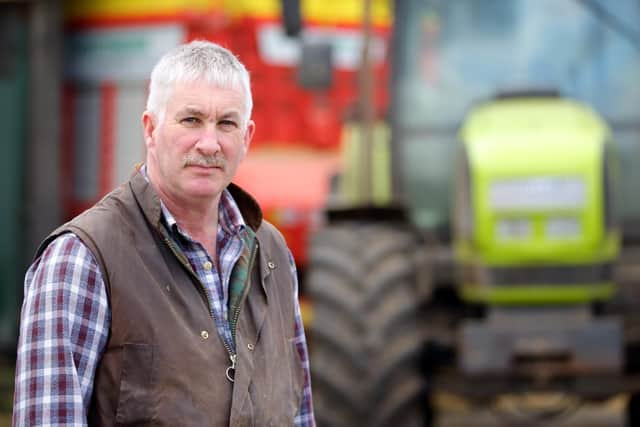Farmers ‘relieved’ after climate change amendments vote
and live on Freeview channel 276
This is a key amendment tabled by Agriculture Minister Edwin Poots, aligning reductions to the advice of the Climate Change Committee.
UFU president Victor Chestnutt said:“Following the further consideration stage, our farmers are utterly relieved that a separate methane target has been supported by MLAs, bringing us back in line with the Climate Change Committee’s balanced pathway for agriculture. This is still a very ambitious target to have within the Executive’s Climate Change Bill. Farmers have not been let off the hook by any means. Big changes will be required of agriculture to meet it, but supported by science and expert advice, our farmers are well up for that challenge and are eager to get to work on combating emissions.
Advertisement
Advertisement
“Over the last few weeks our farmers were put in a very unfair situation, having to deal with frustration and anxiety over a net zero target and the potential detrimental impact it would have on the farming industry – all of which could have been avoided. However, the main thing is that local politicians listened to farmers’ concerns and made the right decisions in the end when it mattered most.


“The final consideration stage will take place next week before the Executive’s Climate Change Bill as it stands, can become law. The worry remains that Clare Bailey’s Private Member’s Bill is still lingering in the background, but the UFU will not rest until a climate change legislation that follows the expert advice delivering for everyone in society is officially over the line. We are thankful however, that at this moment in time, we’re in a much better place than where we were.
“Food security is a massive issue not only locally, but globally, with the population estimated to increase from £7.5billion today to an estimated 10billion in 2050. We’re fortunate in NI to be well placed to produce food from farms with high animal welfare and environmental standards, and it’s extremely encouraging that most of our MLAs now recognise this. They have demonstrated their support for our farmers at Stormont, helping to protect our environment and local food production to ensure that going forward, we have a sustainable agri-food sector.
“Our agri-food industry is part of the climate change solution which our farmers recognise. We now need the legislation in place so that we can continue to drive emissions reductions and carbon sequestration delivering for everyone in NI in a balanced way.”
Advertisement
Advertisement
Sinn Féin agriculture spokesman Declan McAleer has welcomed the acceptance by the Stormont Assembly of an amendment to the proposed climate change legislation for Northern Ireland, which would see a strong focus on biogenic methane levels contained within it.
He added:“The amendment actually voted on was that proposed by farm minister Edwin Poots. And given that the Sinn Féin amendment was adjudged by the Clerk of the Assembly to be mutually exclusive of it, second vote was not required.”
According to McAleer, the climate change bill recognises the needs of the farming and food sectors in a totally holistic manner.
“Our status is now fully compliant with both the UK’s Committee on Climate Change and the International Panel on Climate Change,” he added.
Advertisement
Advertisement
Specifically, the agreed amendment will see methane levels fall to 46% of their 1990 levels by 2050.
“This gives the farming and food sectors the scope that they need moving forward,” stressed McAleer.
“The new legislation will also allow farmers in the north to fully embrace the new climate change-related technologies that are coming down the track.
“Specifically, where methane is concerned we already know feed additives are now available, which can act to reduce the levels of the gas emitted by ruminant animals by up to 30%.
Advertisement
Advertisement
“And there is no doubt that additional scientific breakthroughs will be forthcoming during the period ahead.”
McAleer concluded: “The final climate change bill will still commit Northern Ireland as a whole to a carbon net zero position by 2050. However, there is now clear evidence that new science will play a major role in getting us there. “
Speaking in the Assembly on Monday evening (28 February) Minister Poots highlighted the absolute necessity for Northern Ireland to retain the strongest possible food production base.
From the outset, the minister has sought the introduction of climate change legislation that would fully protect the needs of the farming and food sectors here.
Advertisement
Advertisement
Ulster Farmers’ Union president Victor Chestnut has made it clear that politicians must provide a lifeline to the agri-food sector.
He said: “MLAs have heard the concerns first-hand from our farmers across the country, from the wider-agri-food industry and rural communities. We have stressed to our MLAs that we support climate change legislation that will help us tackle emissions without reducing food production, and now they must work together to ensure a bill is agreed upon that delivers for climate change and everyone in society. The future of our industry is depending on this.”